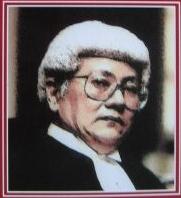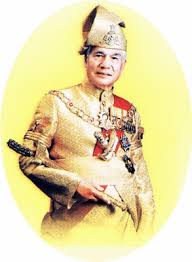by N.H. CHAN
Prologue


I shall start with an aside on the dictionary definition of the two words which feature in the title of this article.
Gobbledegook means unintelligible language.
Regurgitate means repeat information without understanding it. Regurgitation is the noun.
After you have read the article you should have an inkling of what I am trying to suggest with the words. You can then judge for yourself.
There are only two points that really matter in this appeal: Clauses (2)(a) and (6) of Article 16
Let us see if ordinary people like us can understand Clauses (2)(a) and (6) of Article 16 of the Laws of the Constitution of Perak better than the judges of this Court of Appeal.
Clause 16(2)(a) reads:
His Royal Highness shall first appoint as Menteri Besar to preside over the Executive Council a member of the Legislative Assembly who in his judgment is likely to command the confidence of the majority of the members of the Assembly.
Clause 16(6) reads:
If the Menteri Besar ceases to command the confidence of the majority of the members of the Legislative Assembly, then, unless at his request His Royal Highness dissolves the Legislative Assembly, he shall tender the resignation of the Executive Council.
The language of these two clauses, Clause (2)(a) and Clause (6), is easy to understand. There is no ambiguity.
Clause (2)(a) is definitive. It is only in this clause that the Ruler has been given the discretion to appoint a Menteri Besar which is based on his judgment.
On the other hand, it is only in Clause (6) where it is said that if the Menteri Besar ceases to command the confidence of the majority of the members of the Legislative Assembly then he would be able to ask the Ruler to dissolve the Assembly. If the request for the dissolution of the Assembly is withheld by the Ruler (who has the discretion to do so under Article 18(2)(b)), the incumbent Menteri Besar has to tender the resignation of the Executive Council.
It is important that we note that there is no provision for the incumbent Menteri Besar to resign. In fact, in the present case, the incumbent Menteri Besar Nizar had refused to resign even though he was ordered by the Ruler to do so. Of course, all of us know that the Ruler has no such power to order anyone to do anything. It was unconstitutional of the Ruler to do so.
While members of the Executive Council hold office at the pleasure of the Ruler, it is not so with the Menteri Besar.
Clause (7) of Article 16 states:
Subject to Clause (6) a member of the Executive Council other than the Menteri Besar shall hold office at His Royal Highness’ pleasure.
That said, I return to the first part of Clause (6) which I am going to discuss below.
The proper duty of the conjunction “if” is to introduce a conditional sentence
The operative word in Clause (6) is the conjunction “if”. I refer to Fowler’s Modern English Usage (2nd ed) where it says:
if. To avoid possible ambiguity it may be prudent to confine if to its proper duty of introducing the protasis of a conditional sentence, and not to use it as a substitute for though or whether or (with not) to introduce a possible alternative.
In case you do not know the meaning of the word “protasis”, it means the clause that states the condition in a conditional sentence. In English the protasis is generally introduced by if or unless.
But don’t trust Microsoft’s word processor because it suggests the word “protasis” does not exist in the English language. Of course, Fowler is the authority on the usage of the English language (Churchill once wrote to the Director of Military Intelligence about the plans for the Normandy landings, “Why must you use intensive here? Intense is the right word. You should read Fowler’s Modern English Usage on the use of the two words”). Or you may use a good dictionary, not a condensed one, and you will find the word.
The dictionary meaning of the conjunction “if” means “on condition that, whenever” or “supposing that, in the event that”. In the present context, “if” is used to mean “on condition that, whenever”.
So that Clause (6) is to read like this:
On condition that “the Menteri Besar ceases to command the confidence of the majority of the Members of the Legislative Assembly, then,” he can request the Ruler to dissolve the Assembly.
This sentence means that “whenever” a Menteri Besar has ceased to command the confidence of the majority of the Assembly, he can request the Ruler to dissolve the Assembly. As stated in Fowler, the proper duty of “if” is to confine the word to introducing the protasis of a conditional sentence. The condition in the sentence is that the Menteri Besar’s loss of confidence in the Legislative Assembly has to be established first before the Menteri Besar can request the Sultan to dissolve the Assembly.

Therefore, it is only on the condition that a Menteri Besar has lost (ceased to command) the confidence of the majority of the Assembly before he can request the Ruler to dissolve the Assembly.
Definitely, it is not up to Nizar the incumbent Menteri Besar to say that he has lost the confidence of the Assembly. How could he be sure of that without a vote being taken at the Assembly? At best, Nizar could only be guessing. Obviously, the only way in which it could be shown with any degree of certainty that Nizar had lost the confidence of the majority of the members of the Assembly is to go to the Assembly itself for a vote to be taken.
But what happens when an MB had lost a formal vote of confidence in the Assembly and still refused to resign?
But then, one may ask the hypothetical question (because this is not the case here), what happens when a Menteri Besar knows by a vote being taken in the Legislative Assembly that he has lost the confidence of the majority of the Assembly? Can he refuse to resign? Professor Kevin YL Tan in his essay which appears on the web portal LoyarBurok (www.loyarburok.com) tells us that:
This happened in Kelantan in 1977 when its MB, Datuk Mohamed Nasir refused to resign even though he had lost a formal vote of confidence in the Kelantan LA, been sacked by his own party, and had his request for dissolution of the LA refused by the Sultan of Kelantan. The impasse led to the declaration of a state of emergency by the Federal Government that lasted three months, after which the LA was dissolved for fresh elections.
Alas, this single precedent is not particularly instructive. No legal solution was possible and ultimately, the situation was resolved politically by the Sultan dissolving the LA and allowing fresh elections to be called. Perhaps, all rulers and governors should, as a matter of course, accede to requests by their respective MBs to dissolve the LA for fresh elections to be called unless the ruler has a premonition that a calamity might befall the state if he so acceded. That way, new mandates are quickly determined and the business of government can proceed once a new leadership is established. Indeed, the Sultan of Perak supported this view of a ruler’s powers when he was Lord President. In his 1992 essay, “The Role of Constitutional Rulers”, he opined:
“… under normal circumstances, it is taken for granted that the Yang di-Pertuan Agong would not withhold his consent to a request for dissolution of Parliament. His role under such a situation is purely formal.”
This point was picked up by counsel for Nizar and cited with approval by the High Court.
The Sultan has no explicit power to dismiss an MB under the Perak Constitution. Indeed, neither is the Yang di-Pertuan Agong empowered to dismiss a Prime Minister under the Federal Constitution.
It seems that ordinary people are better than these judges because they could understand what the two clauses mean
Now that you are apprised of the meaning of the two clauses that really matter in the appeal, you should be in a better position than the appellate judges who have missed the points to come to their decision.
We all know that whenever there is a situation when there is no Menteri Besar, such as when the incumbent Menteri Besar dies or resigns or has been disqualified as an Assemblyman (because Nizar is an Assemblyman) or has been removed from office by the Assembly, then the Ruler “shall first appoint as Menteri Besar to preside over the Executive Council a member of the Legislative Assembly who in his judgment is likely to command the confidence of the majority of the members of the Assembly”: so says Article 16(2)(a). This is the only occasion in which a Ruler can use his “judgment” to select and appoint a Menteri Besar.
We also know that a Menteri Besar, once he has been appointed by the Sultan under Clause (2)(a), cannot be removed by him. The Menteri Besar does not hold office at the Sultan’s pleasure.
The Sultan has no power to dismiss the incumbent Menteri Besar Nizar Jamaluddin or to declare the office of Menteri Besar vacant: so says Article 16(7), “Subject to Clause (6) a member of the Executive Council other than the Menteri Besar shall hold office at His Royal Highness’ pleasure.” (the emphasis is mine).
So that when Nizar refused to resign after the Sultan has declined to dissolve the Legislative Assembly, the Sultan had no power to dismiss him nor had he the power to appoint another Menteri Besar when Nizar is still the Menteri Besar as he had not resigned his office.
So then, how are we to determine a loss of confidence in the Assembly? Certainly not by an outsider like us. Not even Nizar himself was in any position to say that he did not command the confidence of the majority of the Legislative Assembly. Only the Assembly can determine if Nizar has lost the confidence of the majority of its members.
Therefore, the reality of the situation is that Nizar is still the Menteri Besar when he refused to resign and the Sultan has no power to dismiss him or to deem the office of Menteri Besar vacant.
The Sultan has no discretion or power to appoint a second Menteri Besar when the incumbent is still in office. The Perak Constitution does not provide for two Menteri Besar-s.
Any decision of the courts otherwise is a perverse one because such a decision is not made according to the Laws of the Constitution of Perak.
Don’t you think all of you ordinary people are better judges than these recalcitrant judges of the Court of Appeal? At least (now that you are informed of the constitutional provisions), you know how to apply the relevant law which is applicable in the present case, whereas the judges don’t seem to know how to do it.
Now that you know the law which applies, you are in a position to judge the two judges
So far the Court of Appeal has issued two written judgments. Let us see if the judges who wrote them come up to your expectations.
Raus Sharif JCA who sat as the chairman of this Court of Appeal meandered through 43 tedious pages of his 48 page judgment before he came to the conclusion that Article 16(6) makes no reference to a motion of loss of confidence to be passed by the Legislative Assembly and therefore he concluded that the High Court judge had erred in law. This is what Raus JCA said at p. 43:
For the above reasons, I find that the learned judge had erred in law in concluding that the only manner in which the loss of confidence of the majority of members of the Legislative Assembly could only be ascertained by way of motion to be passed in the Legislative Assembly. Such a finding is contrary to the provisions of Article XVI(6) of the Perak State Constitution which makes no reference to such a motion having to be tabled.
Remember my explanation above about the conjunction “if”? In the instant case the use of the conjunction “if” means “on condition that” or “whenever”. So that the opening words of Article 16(6) should read, thus:
On condition that “the Menteri Besar ceases to command the confidence of the majority of the members of the Legislative Assembly, then,” he can request the Ruler to dissolve the Assembly.
In other words, the loss of confidence in the Legislative Assembly must be established first before the Menteri Besar can make his request to the Ruler for a dissolution of the Assembly. Obviously the only way to establish that Nizar has lost the confidence of the majority is to ask the members of the Assembly themselves. It would be incorrect to ask Nizar because he could only guess at his own popularity.
Undoubtedly, you must never ask the Ruler to determine the loss of confidence of a Menteri Besar in the Legislative Assembly as he has no power to determine on the status of the Menteri Besar’s popularity in the Assembly. And if the Court of Appeal was to confer such power on the Ruler, then it is a blatant refusal of the court to administer justice according to the Laws of the Constitution of Perak.
Of course, in Article 36(2) the Sultan is given a general power “to prorogue or dissolve the Legislative Assembly”.
Yet, the judge has relied on the Ruler’s determination that Nizar no longer commands the confidence of members of the Assembly. This is what Raus Sharif JCA said, at p. 40 of his 48 page judgment:
It is an undisputed fact that His Royal Highness interviewed the 3 independent members separately in order to ascertain whether they were really supporting Barisan Nasional. They informed His Royal Highness that they no longer supported Nizar as the Menteri Besar. Instead they declared their support to Barisan Nasional. At the end of it, His Royal Highness was satisfied that with the 31 members of the Legislative Assembly supporting the Barisan Nasional, Nizar no longer command the confidence of the majority of the members of the Legislative Assembly.
This is a trashy piece of reasoning coming from an appellate judge. Raus Sharif JCA seems not to know that the Ruler is only a constitutional monarch with no prerogative power to do anything but that which the law allows him.
Plainly, the use of the conjunction if in Clause (6) speaks volumes. The loss of confidence of the Menteri Besar in the Legislative Assembly must be established first before the Menteri Besar can make his request to the Sultan to dissolve the Assembly. In this case Nizar requested the Sultan to dissolve the Legislative Assembly before it could be established that the Menteri Besar has lost the confidence of the majority in the Assembly.
Without doubt, it must not be left to interested parties - neither Nizar nor Zambry and his cohorts - to determine the loss of confidence of a Menteri Besar in the legislature. Not even a constitutional monarch could determine the loss of confidence of a Menteri Besar in the Legislative Assembly because he has no power to do so. Not even the judges can confer on themselves a power which does not exist to determine the loss of confidence in the Legislative Assembly of a Menteri Besar except the Assembly itself. It would be unfair and unjust to do so.
The judgment of Ahmad Maarop JCA
Ahmad Maarop JCA arrived at the same conclusion as Raus Sharif JCA except that Ahmad Maarop JCA is more long-winded.
At p. 42 of his 76 page convoluted judgment Ahmad Maarop JCA said:
In conclusion, I hold that there is no mandatory and/or express requirement in the Perak State Constitution that provides that there must be a vote of no confidence passed in the Legislative Assembly against Nizar before he ceased to command the confidence of the majority of the members of the Legislative Assembly. The fact that he ceased to command the confidence of the majority of the members of the Legislative Assembly under Article XVI(6) could be established by other means. Thus, His Royal Highness was right in making enquiries to satisfy himself as to whether Nizar had in fact ceased to command the confidence of the majority of the members of the Legislative Assembly, in considering Nizar’s request for the dissolution of the Legislative Assembly.
It took this judge 42 pages to reach this conclusion.
At the recent launch of my book, How to Judge the Judges, on 29 June 2009, Mr. Justice Gopal Sri Ram FCJ remarked:
But where a judgment is tainted with intellectual dishonesty there is nothing much you can do except to expose the fallacy of the grounds put forth to justify a conclusion already reached before hearing counsel.
Now let us expose the fallacy of the finding of this judge.
The judge said that whether Nizar had ceased to command the majority in the Assembly could be established by other means. One may ask, what other means could there be? He could only give one example. He said:
Thus, His Royal Highness was right in making enquiries to satisfy himself as to whether Nizar had in fact ceased to command the confidence of the majority of the members of the Legislative Assembly, in considering Nizar’s request for the dissolution of the Legislative Assembly.
But, all of us know that the Sultan has no power to do anything except that which the law allows him.
As Professor Andrew Harding has correctly said in his essay “Crises of Confidence and Perak’s Constitutional Impasse” which is featured on the web portals Malaysian Insider and www.loyarburok.com:
Accordingly the issue seems to become, who was empowered to make the judgment as to whether the MB still had the confidence of a majority? The Judge gave a correct answer to this question by saying it is the legislature, not the head of state.
…
But as the Judge also said, it is in any event clear that the head of state is not given the power under Article 16(6), as he is under Article 16(2)(a), to make a judgment as to matters of confidence.
The judge in Professor Harding’s essay is the much respected Mr. Justice Abdul Aziz of the High Court.

ConclusionI trust I have exposed the fallacy of the grounds put forth by the two judges of the Court of Appeal. All of you (the ordinary people), who have been informed of the relevant provisions of the Laws of the Constitution of Perak by reading this article, know that there are only two clauses of Article 16 which apply to the points that really matter before the Court of Appeal. In Clause (2)(a) the head of state is empowered to make a judgment as to matters of confidence. Whereas in Clause (6) he is not given the power to do so but the legislature is.
Mr. Justice Abdul Aziz in the High Court gave the correct answer by saying it is the legislature, not the head of state, who is empowered to make the judgment as to whether the Menteri Besar still had the confidence of a majority. And, I trust, all of you would agree with him.
Raus Sharif and Ahmad Maarop JJCA are wrong. They are wrong because there is no empowering provision in Article 16(6). They did not apply the law as it stands. Indeed they have blatantly refused to apply the Laws of the Constitution of Perak. They should be ashamed of themselves for not administering justice according to law. The common people of this country can now judge them for who they are.
The full text of the two judgments can be found on the internet. If you have difficulty in finding the cases, try www.loyarburok.com here. If you, as a layman, find the judgments unintelligible then that is what the word gobbledegook means. On the other hand, if you find the lengthy judgments merely repeating information which is unnecessary to the two points that matter in the appeal then that is precisely what regurgitation means. So now you can appreciate the title of this essay. - Loyarburok.com




























 day when a traditional hereditary ruler of a Malay State has taken such a rapid slide in his people’s estimation, approbation and adulation as has the Sultan Azlan Shah of Perak. It took one unfortunate, ill-conceived and ill-considered decision over a petition by the Pakatan Rakyat Mentri Besar Datuk Nizar Jamaluddin, to dissolve the Perak State Assembly that has turned Perak into a politically difficult and dangerous situation.
day when a traditional hereditary ruler of a Malay State has taken such a rapid slide in his people’s estimation, approbation and adulation as has the Sultan Azlan Shah of Perak. It took one unfortunate, ill-conceived and ill-considered decision over a petition by the Pakatan Rakyat Mentri Besar Datuk Nizar Jamaluddin, to dissolve the Perak State Assembly that has turned Perak into a politically difficult and dangerous situation. His Highness Sultan Azlan Shah is no ordinary ruler. As a former Lord President and head of the Malaysian judiciary, he ascended the throne of Perak as someone well-qualified by education and training for what, for all practical purposes, is a largely ceremonial sinecure. Be that as it may, the position carries a heavy constitutional responsibility.
His Highness Sultan Azlan Shah is no ordinary ruler. As a former Lord President and head of the Malaysian judiciary, he ascended the throne of Perak as someone well-qualified by education and training for what, for all practical purposes, is a largely ceremonial sinecure. Be that as it may, the position carries a heavy constitutional responsibility.







 APRIL 24 — Come on Malaysia, stop feigning surprise and indignation.
APRIL 24 — Come on Malaysia, stop feigning surprise and indignation.